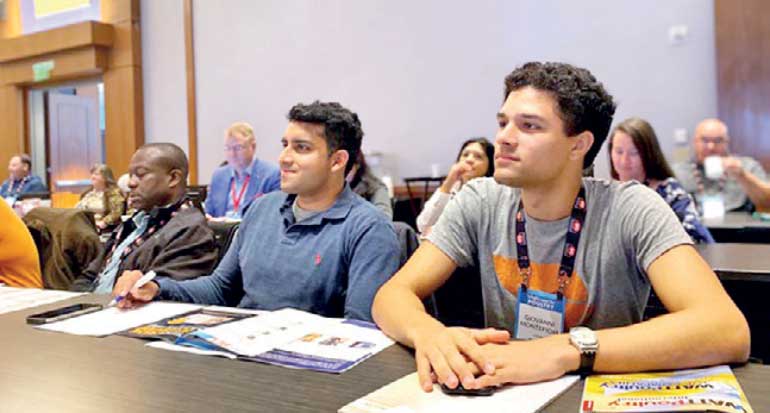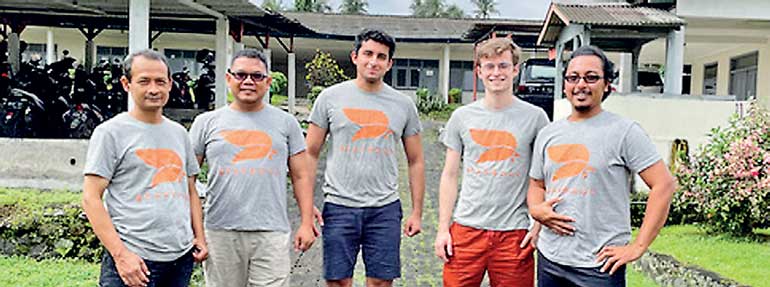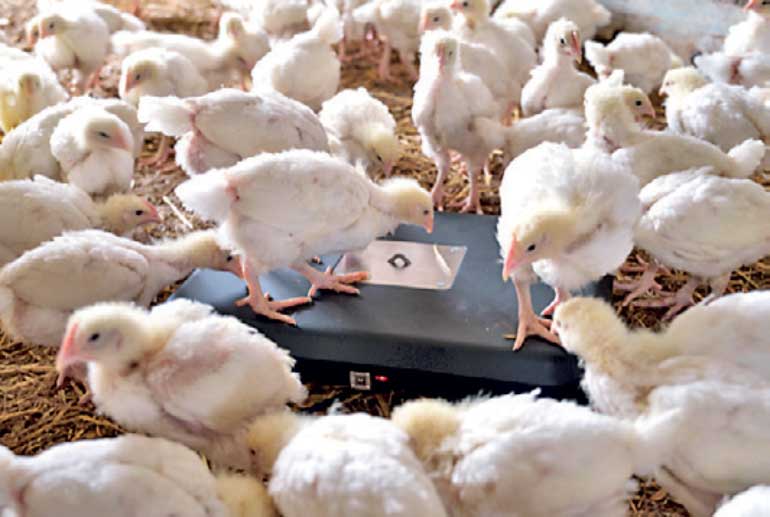Thursday Feb 19, 2026
Thursday Feb 19, 2026
Tuesday, 6 December 2022 00:49 - - {{hitsCtrl.values.hits}}

Beakbook Co- Founder Aamir Faaiz (left) and CEO Giovanni(right)

Beakbook with Japfa farmers

For a long time, technological penetration into the animal protein industry has remained a fringe subject, and, generated little improvement for the lives of farmers, animals and the planet. After finishing his degree in Electrical Engineering, Colombo-native, Aamir Faaiz founded Beakbook to change this. He built an innovative system for weight collection and prediction of poultry, combing low-cost sensors and a custom API.
Outside of farming, the digital transformation has consolidated itself a status quo for many industries, opening possibilities for customised products, improved lifecycle management and much more. Major agriculture conglomerates want a share of this benefit. They are once again opening up to disruptive start-ups who demonstrate the necessary talent and traction to digitally enhance traditional farming. One such medium to establish these partnerships are public competitions.
In 2021, Japfa, pan-Asian agri-food conglomerate, hosted its very first innovation seeking competition called: “Feed the Future Challenge” in collaboration with accelerator company, GROW. The objective was to identify innovations that “improve the effectiveness and efficiency in production of 5 protein groups: poultry, aquaculture, swine, dairy, and cattle”. Coinciding with Japfa’s 50-year anniversary, it is seemingly poetic timing, for Japfa to reflect on its brave origins to guide the direction for their next phase growth and sustainability.
The call for applications to Japfa’s Feed the Future Challenge opened on 1 February 2021 and by its close on 14 March 2021, over 100 agtech startups and scale-ups had applied from all around the world. From 100+ applicants, the pool was narrowed down to the top 20, weighing on factors such as operational impact of the technology, and team expertise. Each start-up was examined with increasing scrutiny over another three rounds, culminating in an interview with Japfa CEO Yong Nang Tan. In late July 2021, the top 3 startups were announced, and received a fully funded pilot rollout as well as the opportunity for commercial deployment across Asia upon a successful pilot.
Representing poultry tech was Beakbook from UK, which began in 2020 at Imperial College London as a research project. Beakbook is a weight collection and prediction tool for poultry, specialising in high accuracy data that farmers can trust. Their technology helps the companies optimise sales strategies, reduce feed waste, and improve animal wellbeing. In a context where startups overpromise and underdeliver, Beakbook’s the narrow focus, combined with a youthful team from world leading universities was likely a welcome breath of fresh air for Japfa and the Jury.
Monitoring body weight is an extremely important part of raising broilers. Typically, farmers weigh the birds manually on a weekly basis, sampling around 1% of the entire population. This generates significant stress for chickens because it requires manhandling live animals and dangling them upside down on a weighing device – in fact in some cases, manual weighing has been observed to increase feed wastage by as much as 10%. Under stress, chicken metabolism increases, and they are unable to convert feed into body mass.
By eliminating this stressful step, the set-up of automated weight collection is intrinsically superior to manual alternatives, with immediate wellbeing and environmental benefits that consumers are demanding to see more than ever. On the farmer side, this subtle change passively reduces the amount of wasted food and water by an expected 1-2%, which is highly valued in a context of 2-3% profit margins for farmers.
The importance of body weight arises because it directly relates to the revenue farmers generated during harvest. It is also a strong indicator for issues that affect performance, such as illness, overheating, stress and so on. Beakbook targets the former via its weight predictions, and the latter by 24/7 monitoring. Prediction enables farmers to optimise the timings for selling their chickens, in order to achieve the highest price. For pre-negotiated supply agreements, Beakbook’s prediction helps farmers ensure their broilers achieve the required weight on the required date, with visibility to perform adjustments ahead of time if necessary. The high-accuracy, 24/7 monitoring element provides a magnifying glass into the lives of their animals. Farmers are now able to detect and investigate problematic signs as early as possible, to minimise animal suffering, and wasted feed arising from distress.
Beakbook’s pilot with Japfa lasted nine months and involved approximately 280,000 broilers. The pilot was arranged into two phases: validation and analytics. The first milestone was to internally validate Beakbook’s claims and establish trust - many years of startup sensationalism has left a cautious taste in the mouths of many agri-food companies. Blind tests were performed for the initial four months, whereby Beakbook was not given access to population weight data (used for benchmarking). Every day, famers received mean weight, standard deviation, and sample size via the Beakbook web app. For the validation phase, Beakbook successfully demonstrated +97% accuracy for mean weight, and also captured sample sizes in excess of 20%. Phase two followed. The analytics phase focused on weight prediction from Beakbook’s machine learning algorithm. Beakbook predicted the mean weight of the chickens seven days in advance, and results demonstrated a prediction accuracy of +95%.
Satisfied with the results, Japfa and Beakbook are now exploring the next steps. As the pilot comes to an end, it ushers in an exciting new phase for Japfa, and also Sri Lanka’s poultry sector. Beakbook have held preliminary discussions with Bairaha Farms. The impacts of automated weighing will be felt across the entire poultry supply chain, and Beakbook affirms that their technology will only improve with time, as they collect increasing volumes of data. Immediate benefits will include the optimisation of selling price, the reduced environmental impact, and improved animal wellbeing. Beakbook expects a wider Japfa rollout in early 2023, followed by an industry-wide rollout in mid-2023. Aamir says he is “keen to launch the technology back home in 2023” as well.